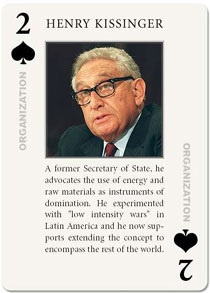 As Dana Milbank of the Washington Post reports here, Henry Kissinger testified yesterday on Capitol Hill that Dubya has “a secret plan” to end the war in Iraq.
As Dana Milbank of the Washington Post reports here, Henry Kissinger testified yesterday on Capitol Hill that Dubya has “a secret plan” to end the war in Iraq.I wonder if that was anything like “the secret plan” of Richard Nixon, for whom Kissinger served as national security adviser, to stall the attempted peace talks in with North Vietnam in 1968 so Nixon could win the election?
That is the charge of authors Anthony Summers and Robbyn Swan made in Vanity Fair magazine seven years ago (noted here by writer Martin Kettle).
Using a go-between named Anna Chennault, Nixon encouraged Nguyen van Thieu, president of South Vietnam, not to participate in the talks. As a result…
…Nixon's efforts paid off spectacularly. On October 31 (1968), Johnson ordered a total halt to the bombing of North Vietnam, the precondition for getting the North and their Vietcong allies to join the talks. Two days later…Thieu announced his government would not take part. Less than a week later, Nixon was elected president with less than a one-point margin in the popular vote over Humphrey.And how did Lyndon Johnson react when he heard Thieu was pulling out of the talks? As Kettle recounts…
…Johnson exploded. He told his advisers that he would go public on a development that could "rock the world". That development, he said, was Nixon's "conniving" with the Thieu regime. An adviser had told Johnson that Nixon was "trying to frustrate the president by inciting Saigon to step up its demands". "It all adds up," Johnson told his advisers.Another factor not to be discounted is the fact that FBI director J. Edgar Hoover knew about what Nixon was up to, but being an ally of Nixon, decided not to tell Johnson. Also noted in the article is the information that Johnson offered Humphrey the chance to go public about Nixon, but Humphrey was afraid that the charges would be seen as election dirty tricks. Once Nixon had won, Johnson again contemplated revealing what he knew, but decided the national interest precluded it.
In the five weeks leading up to the election of 1968, 960 Americans were killed in Vietnam. In the years to come, under Nixon, 20,763 more US soldiers would die.
"What the Nixon people did," the US diplomat Richard Holbrooke, then attached to the advance US guard to the Paris talks, tells Vanity Fair, "was perhaps even a violation of the law.”
So now, many years later, Kissinger slithers forward to concoct more fabrications in front of Congress in the name of furthering another divisive war. And more fool anyone who actually takes him seriously (I’ll leave out the bombing of Cambodia for now, which supposedly wasn’t an escalation of the war).
I’ll let Molly Ivins weigh in on this character once more (hasn’t yet completely sunk in that she’s gone).
No comments:
Post a Comment